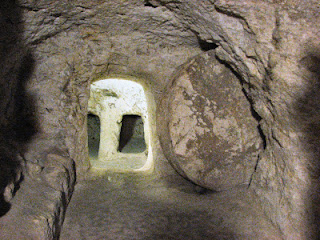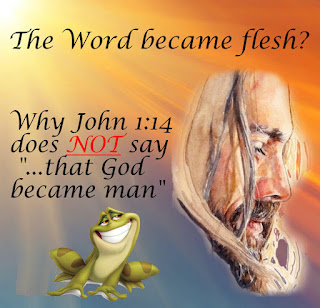The Big Lie: “Death is the Separation of the Soul from the Body”
Many mainstream Christians claim that at death, only the body dies while the soul lives on, consciously entering the presence of God. In this view, believers never really die—they skip over death entirely by transitioning instantly into eternal life.
Related but slightly different, mainstream Christianity has introduced the idea of spiritual death—a supposed separation from God while a person is literally still alive. They assert that Adam, after he sinned, was only “spiritually dead” to God. But the idea is not in the biblical text. Adam’s death was that he would return to the dust from which he was formed.
The focus in this post is that:
There is no place in the Bible that defines death as the separation of the
soul from the body.
So
where did this concept come from?
Plato’s
Influence: Not the Bible
The
idea that "death is the separation of the soul from the body" doesn’t
come from Scripture—it comes from Greek philosophy, especially Plato.
In his
dialogue Phaedo (also called On the Soul), Plato, through the
voice of Socrates, taught that:
“Death
is the separation of the soul from the body... and the state of being dead is
the soul’s being alone by itself, apart from the body.”— Phaedo 64c, 67d
Plato’s
core beliefs included:
- The body is weak,
evil, and a distraction. The body is temporary, inferior, and even
an obstacle to truth.
- The soul is the
true, rational, immortal self. The soul is immortal, existing
before and after the body.
- Death is a liberation,
a separation and freeing of the soul from the prison of the body.
- The afterlife is
a return to the realm of the Forms, where the soul can finally perceive
perfect reality.
These
ideas have deeply influenced Western thought—including Christian theology—but
they are not biblical.
Some
Major Implications of This Platonic View
1. Creation
is Evil; Escape is the Goal
Plato's
worldview implies that all things physical are inferior or even evil.
Therefore, the body must be escaped, not redeemed. This leads to a view of
salvation as disembodiment—a spiritual escape from the physical world.
But the
Bible says otherwise:
- God called creation “very
good” (Gen. 1:31).
- The human body is
marvelously made—some 60,000 miles of blood vessels testify to its
complexity.
- The biblical message is not about escape but about restoration.
Yes,
creation is under a temporary curse because of sin (Romans 8), but God promises
redemption, not abandonment. The key: The Bible promises redemption and
restoration—not relocation.
2. Death
is Glorified
In the
Bible, death is the enemy (1 Cor. 15:26). It is a punishment for sin
(Gen. 2:17, Rom. 6:23). But in mainstream Christianity today, death is often
presented as something to be welcomed:
“My
precious Mike went to be with his Lord in his forever home today.”
“He is
now in heaven with his dad, free of pain and anxiety.”
These
sentiments glorify death. But this is a modern distortion, not the
historic Christian view.
Some early
Christian writers, like Justin Martyr, strongly rejected the belief that
a disembodied human soul “goes to heaven”:
“If
you have fallen in with some who are called Christians, but who... say there is
no resurrection of the dead, and that their souls, when they die, are taken to
heaven—do not imagine that they are Christians.”
— Dialogue with Trypho, Chapter 80
True
biblical hope is in the resurrection of the dead, not in the soul
floating away to heaven.
3. Going
to Heaven is a False Hope, a Lie
We don’t
hope to go dis-embodied to heaven, we hope to be raised from the dead immortal
to like on a beautiful, renewed earth. Resurrection is the hope of Israel. In 1
Thes. 4:13-19 Paul said to comfort one another over the deceased, not because
they are consciously disembodied in heaven with God, but because through Christ,
God will raise them from the dead to new life when Christ returns . In Acts
3:19 Peter says to pray that God would send the Messiah to earth that time of
refreshing may come. Our hope is resurrection life on earth, not dis-embodied
life somewhere else.
4. The
Immortal Soul: The Serpent’s Lie
The
claim that the soul is immortal is not biblical but is part of the original
deception:
God:
“You will certainly die.” (Gen. 2:17)
Serpent: “You will not surely die... you will be like God.” (Gen. 3:4–5)
God
said that man, not just his body, would return to dust:
“You
are dust, and to dust you will return.” (Gen. 3:19)
He
didn’t say, “Your body will return to dust, but you will
live on in bliss or torment.”
Jesus
confirms that the human soul is not inherently immortal, but can be destroyed
by God:
“Fear
him who can destroy both body and soul in Gehenna.” (Matt. 10:28)
So, according
to the Bible:
- We are not unconditionally
immortal.
- We are contingent—our
continued existence depends on God's power, goodness and love.
- Immortality is a gift, granted by God through resurrection (1 Cor. 15:53), not something we inherently possess.
Believing in an immortal or living human soul that is
separate from a human body led to other non-biblical doctrines like eternal
conscious torment, transgender identity as being "a soul in the wrong
body." And, incarnation, that a god soul takes on a human body. As if
the divine soul can put on and take off a human body. The deity of Christ
interpretation of John 1:14 “the Word became flesh” comes from the Greek philosophy
that a soul, in this case a divine soul, can live in or “become” a human body,
then take off the human body out while still living, then put that raised from
the dead body back on again.
Conclusion
The
idea that “death is the separation of the soul from the body” is not found in
the Bible—it’s found in Plato, and the Platonic thinking Gentile “church
fathers” of the centuries after Jesus brought it into their Christianity. And
the consequences of adopting that view are profound:
- It devalues God’s
creation.
- It glorifies death.
- It repeats the serpent’s
lie that we won’t really die and that we will become like God.
- Creates non-biblical theologies like the incarnation of a divine soul in a human body.
The
Bible offers something better: resurrection, redemption, and restoration
of the whole human person—body and soul—through the power of the living God. “God
raises the dead.” Not “God enables his child to escape from his body”. Not “God
relocates his child to a disembodied bliss”. But God raises the dead.
Additional Resources:
Where
do we go when we die? Interview with Pastor Sean Finnegan
https://youtu.be/w8rgs85dBtk
Conditional
Immortality (Restitutio podcast)
https://restitutio.org/2019/02/14/164-theology-3-conditional-immortality/
Challenging
Conditional Immortality (Restitutio podcast)
https://restitutio.org/2019/02/21/165-theology-4-challenging-conditional-immortality/



Comments
Humans will "sleep" between death and resurrection. As in literal sleep, we have no cognizant understanding of the passage of time. Here's more if you are interested: https://youtu.be/w8rgs85dBtk?t=1854